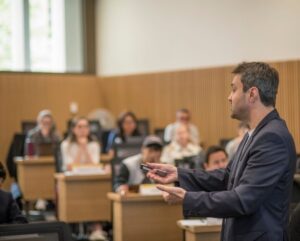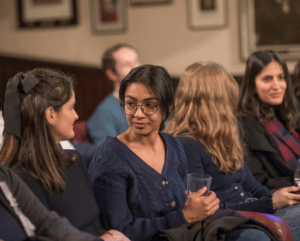Where learning has impact
Experience detailed, team-based learning, tailored to advance your personal ambitions. The Cambridge MBA combines the very best of the University of Cambridge’s academic rigour and excellence with a programme of core courses, electives, concentrations and live, hands-on project work.
Learn with high-achieving, international peers, from a range of professional backgrounds in a class curated to enhance your learning.
The intensive programme is delivered over 4 terms, with 4 projects, 9 concentrations, circa 50 electives, an international study trip and internship option. It’s one year that will change your life.
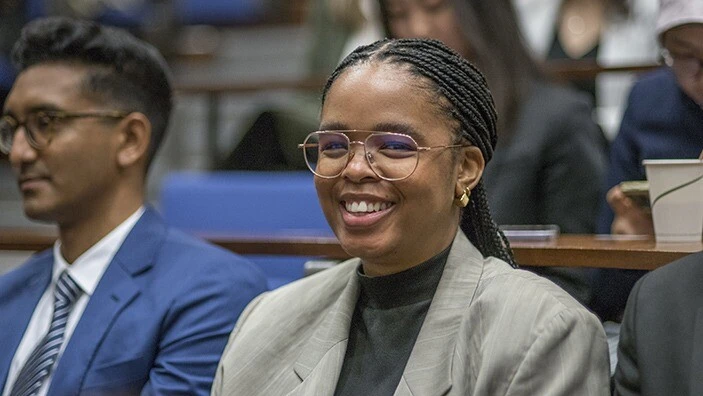
You will get the most from your Cambridge experience if you fully immerse yourself in it. We have crafted the Cambridge MBA Programme to make sure you are intellectually stimulated by a well-rounded business education.
Programme highlights: a transformative learning experience
Live-client projects. Personalised learning. Global treks. Take your time – there’s a lot to explore.
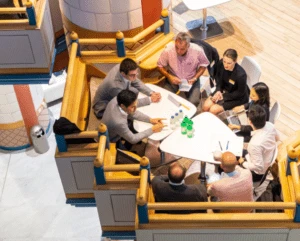
Experiential
Work in small, close-knit teams and practice new skills in live projects with multinational organisations.
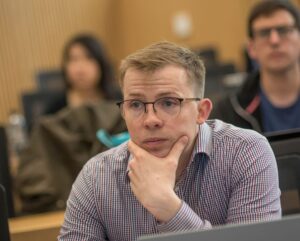
Rigorous and interactive
With interational peers, learn from outstanding, cutting-edge faculty and their network of external speakers.
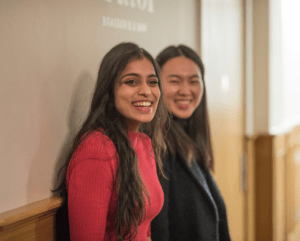
Tailorable
Build a programme suited to you, including electives, concentrations, project and careers options.

Global
Your peers, our research, network, your career opportunities – all globally focused.
The consulting projects you do throughout the year immerse you in situations you haven’t been in before, working on things you haven’t worked on before, with people you haven’t been colleagues with before.
Academic outline
- Michaelmas Term (October to December)
- Lent Term (January to March)
- Easter Term (April to June)
- Summer Term (June to September)
Michaelmas term (October to December)
Team building: project focus
Core courses
- Business and Sustainable Development
- Business Analytics
- Corporate Finance
- Financial Reporting and Analysis
- Management Praxis
- Microeconomics
- Organisational Behaviour and Leadership
Electives
See sample list of electives on our Core courses and electives webpage.
Team project
Cambridge Venture Project (CVP)
The above list illustrates offerings for the 2025/26 class. Both are subject to change, and elective classes may have size limits.
Lent term (January to March)
Team leading: organisational complexity
Core courses
- Strategy
- Marketing
- Digital Business
- Negotiations Lab
Electives
Choose 3 (chosen in Michaelmas term).
See sample list of electives on our Core courses and electives webpage.
Team project
Global Consulting Project (GCP)
Easter term (April to June)
Influence and impact: global context
Core courses
- Macroeconomics
- Advanced Strategy
- Leading Sustainable Business
- Business and Sustainable Development
- Operations Management
Electives
Choose 3 (chosen in Lent term)
See sample list of electives on our Core courses and electives webpage.
Team project
Concentration Project – Board Impact
Concentration
Choose one of the available thematic Concentrations (chosen in Lent term)
Summer term (June to September)
Application and relaunch
Choose one of the following:
- Individual project
- Work placement
- Research paper
- Lean Six Sigma
- Case Writing Workshop
- International Business Study Trip (IBST)
- Sustainability Bootcamp
Core courses
Establish secure foundations on which the rest of your career will be built.
Electives
Increase your employability, explore areas of interest and apply what you’ve learned.
Projects
Live client projects. Personalised learning. Global treks. Take your time – there’s a lot to explore.
Tailored learning: MBA Concentrations
Broaden your perspective, focus your pathway. Our Concentrations offer you the opportunity either to expand your skillset and explore new industries, or gain greater depth in a specific area of interest. Grow your network and open new doors, all with the support of a specialist coach and external speakers who are experts in their field. Combine with other tailoring options, such as projects, elective courses, and career development skills to really advance your journey.
Explore the arts and media perspective on issues confronting all business sectors – globalisation, technology, business model re-engineering, exploitation of intellectual property and much more.
Explore the Creative Industries in the Digital Age Concentration
Learn to lead your organisation through digital innovation. You’ll explore how innovations such as AI, the Internet of Things (IoT), big data and blockchain can facilitate new business models.
Explore energy economics and policy. In a volatile age when energy is increasingly at the top of the agenda, learn to understand the shifts and impact on the business environment.
Discover how to successfully start and grow a business. Or develop core enterprising skills that will help you as an employee in an organisation if you’re not quite ready to take the next step to starting your own business. As part of the Cambridge entrepreneurial ecosystem, our MBA is one of the best places in the world to explore entrepreneurship.
Learn to navigate the constantly changing landscape of finance theory. You’ll analyse financial bubbles, consider the part played by innovative financial engineering and examine the role played by banks.
Explore the politically sensitive nature of healthcare, and the impact of constant technological and scientific advances. You’ll also address the difficult challenges posed by demographic and lifestyle changes and look at potential career opportunities.
Learn how businesses tackle real-world and relevant marketing issues and hear from senior industry speakers sharing their real-life insights and experiences.
Explore the development of creative and practical solutions to complex environmental and social problems.
Gain a practical grounding in core skills, including defining propositions, selling consultancy services and delivering successful consulting assignments. Then, test your abilities in a real consulting environment.
Taking this specialist Concentration, and the associated electives that were very specific to the sector, demonstrated to my potential employers my commitment and passion for social impact.
Your learning experience
Collaborative, innovative, applied and career focused. Learn the Cambridge way. You’ll never look back.
- Engage with a carefully selected international cohort, sharing ideas and experiences in core and elective courses across 3 terms.
- Learn from outstanding, leading-edge faculty and discuss the latest business insights.
- Practice your new skills in real-life situations with multinational organisations.
- Work in small, close-knit teams with classmates.
- Forge powerful networks for the future.
- Hear from industry experts through our dedicated speaker series.
- Enjoy contributions from top-level business practitioners.
There are no formal supervisions through Colleges, or during the course of the MBA. However, there are a great many opportunities to link with academic and professional staff throughout the year, and students are encouraged to use these links.
- Class participation
- Formal written examinations
- Assignments
- Presentations.
Please note, several courses are assessed solely by formal exam, particularly the quantitative courses.
- Explore Special Interest Groups (SIGs) – groups led by students to help you network and collaborate in a particular sector.
- Take part in international treks.
- Access world-class research facilities, including initiatives such as the Entrepreneurship Centre.
- Become a Cambridge Judge Business School alumni member.
- Stay connected as part of our global community.
World class research and teaching
Embark on a learning journey that goes beyond the ordinary. Our exceptional faculty comprises of around 70 individuals who combine cutting-edge research and transformative teaching to ignite your potential and enable your future of success.


